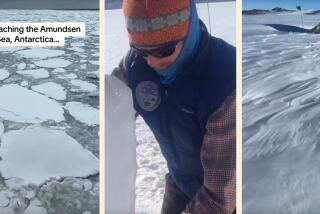As the World Warms: A Talk With UC’s Revelle
- Share via
LA JOLLA — Roger Revelle, oceanographer, science adviser to governments foreign and domestic, remains an active presence in academic life at the University of California campus he helped create. At 79, the man after whom UC San Diego’s Revelle College is named still teaches several classes on science and public policy a year, slowed more by his doctors than any diminution of curiosity.
Revelle, who once headed the Scripps Institution of Oceanography here and later Harvard University’s Center for Population Studies, still turns up hard at work on scientific issues. Currently those issues for him are the “greenhouse effect” and African food production.
As a pioneering oceanographer, Revelle is logically concentrating on the effect on water supplies of the buildup of carbon dioxide in the atmosphere, which increases temperatures much as a greenhouse would do.
“I’ve just been writing a paper on how much I think sea level will rise. I think it’s likely to rise about 1 meter during the next 100 years,” said Revelle, gazing at the waves rolling in near his beachfront home in La Jolla. “That doesn’t seem very spectacular, but that’s quite serious in countries like Bangladesh, where about one-third of the country is within 1 meter of sea level. Florida is the same way. And of course, Louisiana.”
Revelle predicts serious but not dire consequences for the United States. “In agriculture, for example. We’re losing our comparative advantage in agriculture anyhow, and climate change may make it worse. For example, in the Corn Belt in the Middle West, a 2- or 3-degree rise in temperature would have serious affects on corn production. That means of course that you have to use more water. When the temperature goes up, the evaporation increases. That’s one thing that is certain.
“Another thing that is fairly certain is that you’ll probably have more floods because you’ll have earlier snowmelt. So in California you could have lots of floods in the springtime.”
Studying the greenhouse effect is one thing; winning agreement among governments about what to do is quite another.
Different countries have different interests, Revelle notes. “Take an example: the use of fossil fuels, which are the principal source of carbon dioxide in the atmosphere. Half the fossil fuels in the world are in the Soviet Union, 25% in the United States, 15% in China, 10% everywhere else in the world.
“Well, the Russians are going to benefit from the greenhouse effect because an awful lot of their land will get warmer. They will have a longer growing season. The part of the country where it won’t be helpful is the Ukraine and the southern part of the country where it will very likely get drier. So in the case of the Soviet Union, it’s hard to know just exactly where the balance is. In the case of Canada, it’s much clearer. Canada is bound to benefit because it will have a longer growing season and they have no southern area like the Russians have.
“It’s awfully hard to see how you’re going to get a consensus among the nations about what ought to be done. Two things that should be done, I think, are to conserve energy . . . (and) to substitute other sources of energy, particularly nuclear energy, but that’s very unpopular. That looks to me like a very promising thing to do but you have to convince a lot of environmentalists that you can do it safely.”
Whatever is done about the greenhouse effect clearly must be done on a global basis. Revelle has been working on another problem--African food production--that just as clearly must be resolved at its source; that is, as Revelle says, “Africa’s problems must be solved by Africans.” He has been studying agriculture in Senegal, the Ivory Coast, Cameroon, Zimbabwe, Sudan and Tanzania for the National Academy of Sciences, the African Academy of Sciences and the Third World Academy of Sciences.
“If modern, high-level agricultural technology were used, Africa has the agricultural potential to produce enough food for 10 billion people,” Revelle has written. Yet, “African food production is not keeping up with population growth. Food production per capita has declined over the past 20 years, and in several countries food production has actually diminished during this period.”
Why? The reasons seem endless: drought and generally inadequate water supplies, soils that are either crusty or brick-like and too acidic, soil erosion, debilitating diseases such as African sleeping sickness and river blindness, poor transportation, low farm prices, inadequate farm credit and little experience with irrigation. To all these, add the low status of women, who do the bulk of the farming. Women don’t profit much from their own farm products, Revelle says, so they tend to grow only enough for their families.
He points to Zimbabwe as an exception to the dismal African agricultural picture. Keys to its success, in his eyes, are the guarantees of high prices, a network of distribution centers for seeds and fertilizer and pesticides, land reform that helps peasant farmers, loans to small farmers, equal rights for women and racial peace.
Revelle’s work has taken him far afield of his early intention to become a journalist or, later, a geologist. Born in Seattle in 1909, he moved with his family to Pasadena when he was 7. He went through Pasadena public schools and was turned toward geology by an inspired teacher at Pomona College. He attended graduate school at UC Berkeley as a geology teaching assistant.
“I have worked for the University of California during most of my adult life, but mostly in La Jolla, about as far from Berkeley as one can get and still be in the state. Thus, whenever I go to Berkeley a chill runs up and down my spine for the sheer joy of being there,” Revelle said.
More or less subconsciously, Revelle switched from geology to oceanography in 1931 after a splendid day off San Diego aboard a purse seiner that passed as the Scripps Institution’s oceanographic ship. “Being at the same time a sailor and a scientist just seemed to be too good to be true.” The change was opportune, because he had discovered, on a field trip, that he was afraid of heights--a definite drawback for a geologist.
Revelle has put science to work for others for decades, starting with oceanographic research during World War II and later helping Pakistan solve critical agricultural problems. He does the work but draws back from urging changes in public policy. “It seems to me that the responsibility, the duty, of a scientist is just to give the facts, ma’am, as best you can and let the politicians think about the political implications.”
But what of the scientists who feel they need to be activists to get the politicians’ attention?
“That’s all right--scientists aren’t eunuchs,” he said. But finding solutions is the politicians’ business. “That’s what politics is all about: policy. Science is not about policy. Science is about nature and what the world is like.”






